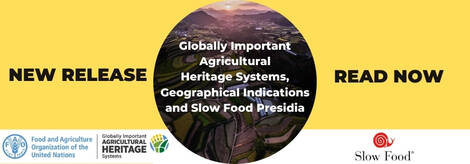Join us in celebrating the 2nd Dialogue on Globally Important Agricultural Heritage Systems in Europe and Central Asia
14 April 2021
14 April 2021

FAO
The 2nd Dialogue on Globally Important Agricultural Heritage Systems (GIAHS) in Europe and Central Asia aims to promote the recognition and awareness-raising among countries on potential GIAHS sites in the region and develop a regional road map for the dynamic conservation of these resilient agricultural systems.
Experts and participants will present already existing advances and potential GIAHS sites in the region.
This meeting will give an opportunity to countries in Europe and...

FAO/ GIAHS
Rome. - When academics, stakeholders and decision-makers refer to these three approaches that recognize food systems' value, confusion often arises.
In a joint effort to clarify these concepts, the Food and Agriculture Organization of the United Nations, Slow Food Presidia and the Aichi Gakuin University, Japan joined forces to flesh out the linkages between Globally Important Agricultural Heritage Systems (GIAHS), Geographical Indications (GI) and Slow Food Presidia.
The technical note highlights each...

The Food and Agriculture Organization (FAO) Globally Important Agricultural Heritage System (GIAHS) Programme welcomes the UN General Assembly's resolution adopting May 10th as the International Day of Argania. The UN resolution, submitted by Morocco, was co-sponsored by 113 member states of the United Nations and adopted by consensus.
In December 2018, FAO recognized the Argan-based agro-sylvo-pastoral system within the area of Ait Souab - Ait Mansour in Morocco as a Globally Important...
FAO and Japan urge increased responsible investment for greener, stronger agri-food systems
09 February 2021
09 February 2021

Japan is stepping up funding for FAO in three key areas, Vice-Minister for International Affairs at the Ministry of Agriculture, Forestry and Fisheries (MAFF) Makoto Osawa told Director-General QU Dongyu, as the two officials met virtually today. Osawa went on to list the strengthening of agricultural supply chains in the context of the COVID-19 pandemic; the promotion of traditional healthy diets; and statistical capacity.


